
Arno Michaels used to be a proud Wisconsin white supremacist. He had a “hate metal” band, Centurion, that sold some 20,000 CDs about killing blacks and Jews, and undoubtedly acted as a soundtrack to fear and torment. (It still does; there remains a following in Europe.) But last year Michaels started an organization called Life After Hate, a web mag preaching anti-violence, and wrote a book My Life After Hate. It’s part of his journey from hate leader — he organized 1988’s Skinfest, which attracted monsters from all over the country to Milwaukee — to, well, anti-hate leader. Now 40, Michaels has a lot of making up to do. Things changed in the 90s, when he saw his own daughter at day care playing with kids of all races. “I didn’t want her to be a victim,” he told the Shepherd-Express in February. “I thought about the parents of kids I’d beaten up. They loved their kids as much as I loved mine. It really hit me how horrible I’d been. I really regretted it.” Now, he says, “hate was justified by a claim of love for the white race.” That’s what he believed from around age 17 to 24, when he was, let’s say, an active racist. But white power isn’t limited to targeting non-whites. It extends to targeting non-straights. Speaking to the Wisconsin Gazette‘s Will Fellows, Michaels explains why anti-gay hate was simply part of the mix. It’s something he knows about all too well: his first arrest was for a gay bashing, and he’s personally inflicted plenty of pain on our community simply for being queer.
What was the status of gays in your hate hierarchy?
Homosexuality was seen as a sick perversion of the natural order, an unnatural and unhealthy lifestyle choice, a symptom of the sick society that Jews were scheming to bring about. White men and women who were recruited into homosexuality wouldn’t produce more white offspring, further reducing the already sputtering white birth rate. Like everything else we didn’t like, homosexuality was seen as part of the Jewish plot to take out the white race.
Along with a desire to clean up society, seeking out gay people to attack had something to do with making a statement about our own masculinity. Gay people were generally easy targets. Anytime we encountered them we would hurt them if we thought we could get away with it, sometimes even in broad daylight in crowded areas. I believe the first time I was arrested as a skinhead was for attempted gay-bashing. A friend and I were caught in the alley behind a gay bar, armed with axe handles.
In one incident, I broke a gay guy’s eye socket with my elbow when he tried to respond to the taunts of my buddies. I will be haunted by that man’s broken face till the day I die. Today, my outspoken opposition to discrimination against LGBT people is driven as much by that memory as by a zeal for human rights in a broader sense.
How did anti-gay hatred compare to race/ethnicity-based hatred?
Both types of hatred are rooted in a fear of difference. Skinheads, like other fundamentalists, seek uniformity. Just as we pointed out and belittled African lips, Asian eyes and other racial/ethnic differences, we were always vigilant for differences in sexuality. The slightest bit of femininity displayed by a male was grounds for assault.
As whites, we didn’t worry about having to prove how not-black we were. But it was always important to keep your distance from homosexuality. Any good white man worth a damn had to either have a steady girlfriend, wife or a steady wake of female conquests to prove how not-gay he was. For those guys who weren’t a hit with the ladies, being called a faggot was always a concern. They would try to establish their heterosexuality by bashing gay men, verbally and physically.
Did you ever get to know any gay people?
I did have an uncle who was gay, who was ostracized by my family. I saw him as a tormented and mean person, which I blamed on his homosexuality instead of on how he was treated because of who he was. Back then, I cited my uncle as my personal connection with the sickness of homosexuality. He died alone in a mental hospital, and my aunt later took her own life in response to the guilt she felt for betraying him. Today, I cite my uncle’s sad story as my personal connection with the sickness of intolerance.


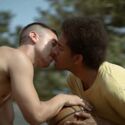

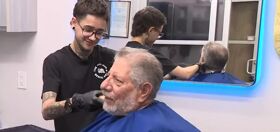

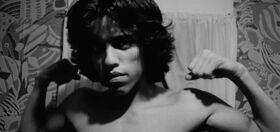
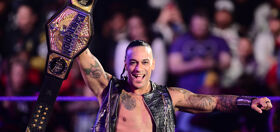

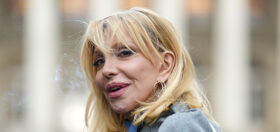


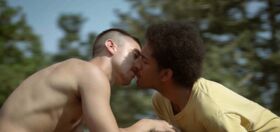

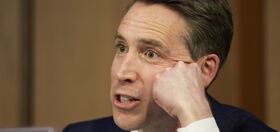
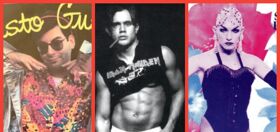

tallskin2
Jeez my knees.
We had the case of Nicky Crane over here in the UK, a homosexual skinhead, who died of AIDS, but who attacked blacks and asians, and who was a leading member of fascist groups and a steward on London Pride marches.
A thoroughly fucked up and nasty piece of work.
You can read about him here.
http://en.wikipedia.org/wiki/Nicky_Crane
[img]http://media.photobucket.com/image/nicky%20crane%20skinhead/SiddenyVicious/NickyCrane.jpg[/img]
johnny
It is amazing that white supremacists can justify their hate by saying that they feel threatened. White people, despite what the China-haters say, continue to control most of the world’s wealth.
However, as a member of a minority, I at least know where I stand (or kneel) with them. I prefer their venomously expressed brand of hatred to that of those white gays who ask for tolerance from the society and yet scapegoat and discriminate against blacks and Latinos whenever they feel they can get away with it. Witness the reaction to the Prop 8 failure in California.
Arno Michaels
I appreciate the thoughts and commentary on the article! Do need to mention that “Skinfest” was in 1988. I was long gone from the white power movement and wallowing in the Midwest Rave scene by 1998.
peace,
-arno
michiko
Arno, if you’re still reading the comments I appreciate your honesty about your past as well as your efforts to make up for it. You sound like a genuinely changed person. And I think many of us readers (at least the older ones) can relate to bullying gays to deflect attention away from ourselves. In my case it was just verbal abuse I spewed, but the reasoning was the same.
just sayin
I’d hit it.
Warlord838
Hip Hop and Rapper band Black,Brown and Tan. the people Hate too who Attack or mudure White by racial.
McMike
It’s unfortunate people don’t deal with reality when they try to say homosexuality isn’t natural since it’s been well documented in over 1,500 species of animals in nature. But, you know, what’s a thing like a fact to get in the way of hate? What’s also annoying are these guys thinking they’re proving how tough they are by ganging up on one guy. It’d be nice if any of them ever grew the balls to attempt to take on another guy by themselves. I, for one, would welcome it.
ewe
@johnny: you are talking about the reaction to ignorant black evangelicals not the whole of Prop 8 opponents. That, too, was discussed in detail and other groups were ostracized for their part as well. You conveniently left that little tidbit out of your remarks. You are a demonic monstrosity for trying to label and pin racism on those that are discriminated against. FYI: there are gay people of color who spoke out against ignornant black evangelicals much the same way we do about the white Tony Perkins and white Jerry Fallwells of this world. Basically you are the one promoting homophobia and trying to get away with it.
Kev C
Let me explain why people who bash others are stupid, savage cavemen who shouldn’t breed but go extinct.
ewe
@Arno Michaels: Keep in mind that it is minorities that tolerate people like you (used to be) not the other way around. You are on probation as far as i am concerned. PEACE.
hephaestion
Arno, thank you for your work for love & understanding today. My grandfather became a racist when he lost his N.C. general store during the depression. He joined the KKK. But he also found a way out of the hate, and by the 1950’s he was doing all he could to help blacks in his community. We can all fall prey to hate – any of us. Those of us lucky enough to be freed of hatred need to be humble about it, because no one is perfect. Racism & homophobia are evil but they are everywhere and for many it is hard to avoid them. We must just endlessly try to live a life of love for all, and to show everyone how to overcome racism and homophobia.
ForeverGay
If you are a gay person and this stuff shocks you then you either just came out or are dumb. It’s common for heterosexual males to join groups/gangs when they are young to “gain” an identity/ feel like they are apart of something then leave once they found a long-term female partner and had a child. Heterosexual male identity is always on shaky ground because it’s largely based on what you are not. You have to prove you are not something whether it’s gay, wussy, coward or bum.
reed
i just want to be clear there are plenty of skinheads (the proper kind) who aren’t into hate. look up SHARP (SkinHeads Against Racial Prejudice).
there’s plenty of skinhead appreciation blogs around the ‘net 😉
kiriakis
@ewe:
Are you really as ignorant as your comments make you sound?
johnny
@ewe: Ewwwwwwwwwwwwwwww! Educate yourself. I’m gay and proud. I’m only homophobic against those gays who ask for tolerance and yet are sorely lacking in that quality as you seem to be. Your comments to Arno Michaels are uncalled for. It is extremely clear in his article how repentant he is for his past acts of cruelty and intolerance.
Obama DID say DADT would happen on his watch... (John From England)
@johnny:
Bulldhit. What if he’d smacked you in the mouth and you had a deformity? Dumb ass.
Lemme guess? You’re White and you prolly have never been shat upon for being you unless it was cause you were gay?
As a black gay guy, you go to hell.
Arno Michaels
@ewe:
“minority” is a relative term. On a global scale, “white people” are a minority. Scientifically there is a single human race. The truth of our common ancestry has been established via DNA. We all came from Africa.
and I appreciate the chance to prove myself. You decide if I walk the walk or not. Feel free to keep in touch and let me know how I’m doing
Arno Michaels
@hephaestion
this means so much to me. I am so fortunate to have been forgiven and embraced time and time again by people who I had once claimed to hate. Your thoughtful comment illustrates how wrong I was then, and how right it is now to follow your example of strength and courage. Early in my skinhead days, I went from a drunken hooligan to militant because well-meaning people responded to my foolishness with violence. It only made me more violent. Today, with the help of everyone from conscious beings like yourself to the kids we work with in anti-bullying programs to all the readers, writers, and artists who include to produce Life After Hate, basic human goodness is being demonstrated and cultivated. That’s the simple truth that all human beings have an innate need for compassion coupled with the ability to give it. Demonstrated by your grandfather when he accepted the compassion of brothers and sisters he had once claimed to hate. This truth exists regardless of divisive constructs like race. Celebrating differences like gender, sexuality, and ethnicity resolves the true beauty of us all.
I am a work in progress, like everyone else. I’ll continue to make mistakes. All I can ask for is a chance to earn your respect. Treating me with compassion empowers me to deliver, and vice-versa. This interdependence is the essence of humanity. We can make the Earth a more peaceful place if we’re able to keep that in mind.
you made my day =)
Arno Michaels
@johnny:
thanks for the compassion brother. I will do my best to be worthy of it. You set an example of honor I hope to follow.
tallskin2
@Arno – I admire your bravery in attempting to atone for past bad deeds. And publically coming on here to express regret.
As the story of Nicky Crane over here in the UK shows being born gay does not protect one from hatred of others or outsiders. None of are immune from hatreds. I have to control my particular dislikes, but I guess my hatreds are pretty mild compared to those you experienced during your teenage years.
But I am interested in what you think transported you from being just another drunken lad into one who actively sought out people who were different to attack them? Was it the group dynamics? Ideology?
Or do you think it was an overdose of testosterone pumping through you?
And how does a society, here in the UK or in the USA, prevent its young men from going down the same path?
Arno Michaels
@reed:
SHARPs accomplish nothing but to fuel the fire of racist skinheads. Violence can do nothing but beget more violence. Every time I was violently opposed—and I took all kinds of punishment in the process—I became more vindicated and entrenched in my racist ideology. All the SHARPS on Earth couldn’t have cured me of racism, or made me anything but more violent.
I appreciate that many SHARPS have their hearts in the right place, but if they are truly passionate about peace, then they need to be the change they want to see and oppose hate in the most effective way possible—promoting peace. Setting an example of strength, honor, and courage by solving problems nonviolently. Ask yourself honestly what you want. Is it a peaceful society? Then start walking the walk. If you truly want violence then how different are you from the boneheads? I hear from just as many former SHARPs as I do former white power types, and the, “damn was I an idiot!” sentiment is the same. Just like it is with my brothers and sisters who were former gangbangers.
I’m not a pacifist. If someone attacked me or anyone else around I would take action. If nazi-skinheads are attacking you by all means defend yourself with everything you got, but thinking you are going to out-thug a bunch of other thugs can only lead to more thuggery.
ewe
@kiriakis: do you assume people know what is going on in that brain of yours. Care to elaborate?
glasshouses
Arno,
I share with those who commend your willingness to understand and move to a new place of thought and compassion. I have a few questions, if you happen to still be reading this blog:
1) I did some research on Tom Metzger’s recruitment tactics, mostly on the use of cultural and rhetorical artifacts with CA skinheads. Were you drawn to this group for particular ideological reasons about/against others or for more a feeling of being/becoming part of a particular group?
2) As you may know, there are some really negative reactions from family members toward LGBT individuals. You noted that you changed your ideology when viewing children and thinking of their families. Did the reactions–imagined or real, positive or negative–of family members have any reactions to you when you were part of Whitepride?
3) A bit of a strange one: How did you know the cultural identity of your victims? There have been some suggestions as to commonalities in experiences between GLBT and Jewish folks (obviously noting that the two are overlapped, including in my case.) For example, it is just as easy to note that you or someone “looks” Jewish as potentially being non-heterosexual. I “pass” for not being a Jew all the time (often I have had to say: “do I really have to explain the whole blond hair, blue eyed, prominent cheeckbones, very Anglo last name, “yes I speak German but so do a lot of Jews” thing one more time?”). Keeping that in mind, what makes one resemble that which is not Jewish, especially in terms of cutlural and non-religious Jewishness? You’ve explained the public display of proving one’s heterosexuality; how does one prove one’s non-Jewishness (yes, as I’m waiting for it from others, outside of circumcision; it’s not just for Judea any more.)
4) Daft question, I know: the head shaving must only be one sign of affiliation but how does a person with a shaved head (non-political, just do it) strike a person who does so for political/ideological reasons?
Thanks for any insights that you can give and for your willingness to come to this blog. I can think of a lot of people who would never have that sort of outreach.)
ewe
@johnny: Ha. Tolerance is what minorities do everyday. you got it backwards. My comments to Arno are just comments. His behavior was far worse. I am not jumping on any bandwagon of forgiveness just because he had a kid and realized that a concern for others was born.
randy
Arno’s comments remind me of a saying that if you want to oppose Satan, the best way is to love him. After all, what better way to heal him?
I always thought that interesting, and now you prove it. You say that hating hate only begets more hate — it doesn’t stop it or ameliorate it. The only way to confront hate is to show love, compassion and acceptance.
So those Christians who claim to hate the Devil are only doing his work, but certainly not God’s work.
Additionally, your experience proves another study that was undertakin in Britain several years ago that suggested that young men don’t target gays because gays are weak, they target gays because they are unsure about their OWN masculinity.
Arno Michaels
@tallskin2:
great thoughts here! Without doubt it was violence itself that sent me further down the hole. The more violence and hate I radiated, the more came back to me, which made me even more violent and hateful, etc. You can read all the gory details in My Life After Hate http://lifeafterhate.org/my-life-after-hate/ …which you are welcome to read the free PDF download.
Nick Crane’s story is another sad example of self-hate manifesting itself as hate for others. I imagine if Nick would have been able to be who he was he wouldn’t have had the inner-violence that drove him to get mixed-up with Skrewdriver. Conversely, if Ian Stuart and every single other white power skinhead (including me back then) had the courage to live open and honest lives we wouldn’t need to false security of hating him and every other LGBT person.
inre the best way to prevent others from making the same mistakes, it’s really quite simple and everyone has all they need to make it happen: take personal responsibility for the impact of your decisions on yourself, others, community, society, and the Earth. Doing so sets an example that when combined with transparency and accountability has the power to change lives for the better.
You have changed my life for the better by asking me this question. Open honesty inspires more of the same, functioning according to the same spiritual physics that drove the aforementioned cycle of hate and violence.
Conflict and competition are healthy, natural parts of human life. As is imperfection. Understanding that change is constant helps nurture the inner peace that provides a foundation for the strength necessary to exercise that true personal responsibility.
Sounds all metaphysical and whatnot, but is actually very practical and easy to get rolling. Just treat everyone you can with kindness and respect, as often as you can. When you fuck up, learn from it and move on. When you encounter hate and violence, protect yourself and others with compassion.
Do positive work in your community. Pick up trash. Hold doors for people. Smile at everyone. All of those gestures of honor cumulatively empower society to be more peaceful, leaving hate less purchase to take hold.
ewe
@Arno Michaels: “Minority” is a relative term and white people fill that statistic? Is that what you just said to me? Care to explain to all of us in detail the one about your jewish conspiracy again? Here’s the chance you just asked for.
Arno Michaels
@glasshouses:
those are fantastic questions and I want to answer them in more depth than I have time for tonight. I will try to post back tomorrow but by all means, hit me up via the contact form on http://lifeafterhate.org and I will e-mail them to you as well.
Arno Michaels
@ewe:
If ten tall people are in a room with one short person, they are the majority. If those same ten tall people are in a different room with 100 short people, they are then a minority. In the USA, “white people” are a majority. Worldwide, they are a minority. Hence the term “minority being relative to context. “Short” and “tall” are relative terms as well, but they must be acknowledged before they can be used to sort a majority from a minority. Because it has been scientifically proven that there is only one human race, I don’t acknowledge the idea of a “white race” or a “black race” or anything but a single race. Therefore the idea of a “racial minority/majority” is flawed.
The “Jewish Conpsiracy” that all white racists base their hatred on—and yes I did too up until I left the movement in 1995—is in essence the idea that Jews as a people hate white people and are hellbent on the extermination of the “white race.” From there all sorts of extrapolations are made, sometimes in various directions, inre all the “non-white” people, and anyone else who doesn’t conform to the uniformity of complexion and thought.
I’m happy to tell you everything I know about how racists think. But I do ask that you read Life After Hate magazine and/or my book first. Both are available for free at http://lifeafterhate.org
Hope that makes sense.
Arno Michaels
@randy:
your comment is a gift to me as well Randy, one that I treasure. Will try to respond more in-depth tomorrow. Please feel free to friend me up on Facebook and/or use the contact form on the LAH site to keep in touch
ewe
@Arno Michaels: please. you are the type of person if at all transformed would be better suited to just put a cap on it and consider yourself ahead of the game. People with your history should shut it and listen up. What could possibly make you think that i am gonna get from you anything that i don’t already fucking know?
OY VEY.
Girlfriend, i think you’re a gay man and that’s where all of us here on this bloggy thingy can be of assistance to you so by all means do come back now ya hear?
Darling i love you but give me Park Avenue!!! dodododoo. bumpbumpbuddump.
I smell a book tour and a lecture circuit.
Arno Michaels
@ewe:
I understand your skepticism and don’t blame your for it. You are free to condemn me and anything I’m involved with. Doing so will carry much more weight if you take the time to get to know me first—a courtesy I denied many innocent people before I hurt them, so I’m not shocked that it still comes back to me—but if you want to perpetuate that sort of thing who am I to get in your way.
I’m done for the night everyone.
I appreciate all of the thought and energy here. Especially yours Ewe
ewe
@Arno Michaels: The “jewish conspiracy” is not a movement. It is a fairy tale dreamt up by a bunch of lazy trash that are looking to blame others for their failures and lack of initiative. They focus their attention on a convenient target to hate. They then take their frustrations out on those that strive to be productive because for some flipped out reason i don’t give a shit about, racist skinheads prefer to receive something of value for doing NOTHING.
dfrw
Good for you, and for us, Mr. Michaels. Being a good human is a continuous effort for all of us, particularly in our polarized societies and communities. Your redeeming efforts will be considered by many. All the best.
ewe
@dfrw: yeah sure. and maybe someone should tell someone to change the graphic on the above photograph given that the pure white driven snow is directly behind the changed white supremacist. What’s next? Sarah Palin with a russian moose wandering around?
reason
@ewe: The strange thing about it is that you are in the same place that he used to be in with your hatred. Race, religion, sexuality are all just constructs where the bad comes in is hatred and you seem to have a lot of it.
I personally believe in redemption, whether it is Vick with the dogs or Byrd with the klan (I am not comparing the two). People do ugly things in this world but the question is whether they learn from it and become better people. It sounds like Arno has done some despicable things that I find revolting and despise the person he was, but I am willing to look past that to the person he is today. That is what he will be judged on, to many people don’t realize that it doesn’t matter where you started, it matters where you are going and where you end up. I understand that we can only see his actions which have apparently improved, but we can’t read his heart and know if he is sincere. The truth is, the only persons that it matters to if he is sincere is to himself, whatever is in his heart he has to live with it and will be judged on when he dies. That is an important message to people that are trying to turn around their lives, to many lose steam becuase of judgmental people like ewe that try to tear them down at every corner, they need to know that the they should want to change for themselves not the public, the victims, or in the name of doing what is right. Being a good person is a personal victory that no one can take away from you, and if you have truly made the change you should be proud of yourself regardless of the thoughts of anyone else including me.
ewe
@reason: I confront honey. I don’t hate. You are as cuckoo as they come if you think me making comments about racist skinheads physically assaulting their target can be even remotely compared in the same light. You say he will be judged on what he is doing today? Oh please enlighten me about your personal gODD concept as if any of it is anything but wishful thinking and bullshit. The only thing that matters is this ex? supremacist fucking apologizing and specifcially saying he was wrong. WRONG! That’s it. Very simple. I have not heard that yet. He can unfold and deliberate in private and so can you if you can’t handle other peoples reaction to a differing opinion. You seem perfectly content to dish it out though. Now take it as well. Spare me your rendition of the truth. People like Arno have proven to be like the wind. Not dependable.
ewe
@reason: not dependable unless harnessed.
reason
@ewe: And let me guess EWE, you are going to harness him. Get over yourself, no one owes you anything. He needs confirmation from nobody, but himself. Being good is a personal victory.
B
No. 2 · johnny wrote, “It is amazing that white supremacists can justify their hate by saying that they feel threatened. White people, despite what the China-haters say, continue to control most of the world’s wealth.”
They probably do feel threatened, but don’t realize that it the increasingly skewed distribution of wealth in the U.S. that is the problem. See http://sociology.ucsc.edu/whorulesamerica/power/wealth.html for the numbers.
BTW, from 2002 to 2005, the U.S. GNP per capita rose by 24% while China’s rose by 83%. Technically astute people who’ve visited China will tell you that they expect China to eventually surpass the U.S. technologically – there’s simply a lot of energy and enthusiasm.
http://roomfordebate.blogs.nytimes.com/2010/01/18/will-china-achieve-science-supremacy/ has some info for anyone interested
(it’s not sure thing for China – they have to solve some internal problems – but they are trying).
reason
@ewe: Actually I was referring to the arc of your comments over a broad selection of topics, not just this particular case. You are exhibiting a pattern which most people have picked up on. Wish I knew what makes you so bitter; regardless, I have to sleep. Have a good night.
ewe
@reason: I never said or felt anybody owes ME anything. There is nothing to get over. Your thinking is very twisted. This ex? supremacist saying he was wrong does nothing for me in the long run. I don’t even a person like that deserves a platform. An apology would be for those he viciously hurt. Meanwhile back at the ranch “Reason” is placating and making excuses for the (how can i say it?) EVILDOER, past tense of course. We think. You hope. Is that more your style?
ewe
@reason: Have you heard of oppression and discrimination? If you read the comments of the few others attacking me, it has nothing do with what i am saying. They don’t even address the questions i have for them. Instead they concentrate and attempt to silence me for having a different opinion. Granted i am quite adament and sometimes tactless. I know that. What make you think your comments are so much more virtuous? What a joke.
ewe
@reason:To be perfectly honest, i was coming to the defense of the wind with my comment about harnessing. Wind turbines that make electricity etc. I wanted to remedy my comparison of the great power of wind and this worm who used to beat up people he found to be unworthy of him. It just went over your head is all.
ewe
@reason: sweet dreams. have a good night. no hard feelings ok sista?
Kev C
I do have a problem with people who make a profit or a career from their former abusive ways. Sounds like a christian redemptionist thing. Someone who molests dogs and children all his life suddenly repents and everyone calls him a champion. Then he goes on Oprah while Jesus comes down from heaven and personally hands him a cheeseburger.
Beau
The content of these arguments is pointless. What they are saying never makes sense. They’re trying to rationalize the hate. Not the other way around. The true reasons are dark and hidden or ridiculous. Maybe they don’t even know them. Or maybe there is no reason at all. Maybe there’s just influence or pressure. Arguments are good to spread hate and talk about it with others.
People aren’t born with hate. But the enjoyment of supressing the weak is part of the human nature. Wether it’s winning a game, school bullying, instating discriminating laws,…
Matthew Sommerville
Thank you for insight Arno, and for changing.
RLS
I know with this being Queerty and him being a white male, everyone is going out of their way to worship him, but this black queer could really give a shit less.
I have no compassion or interest for someone who makes a livelihood and a way of life out of violently racist and homophobic activity, then turns and uses that white privilege as a way to make a second career out of preaching against what they did before.
None. At. All.
theatresomething
@ewe:
So, you’ve plainly stated that rather than Arlo use his knowledge and past to not only educate those he previously attacked in the ways he went about carrying out his actions, but to also expose those that are still out there for what they are and how they operate (which I can only assume puts him at some risk for retaliation) and to try to insure that maybe just one person will avoids making his mistakes, he should put himself in a closet and until the day he dies wallow in his guilt.
You also seem to think that those he oppressed should have a direct reaction to him: to jeer, sneer, hurl anger, insults and generally treat him as less than a human being if he dare to step out of that closet. Sounds an awful lot like the kind of thing his former colleagues would suggest I do as a gay man.
I am sure that you will read this and retaliate with a comment that points out my ignorance and possibly even tries to persuade me that I should ridicule and despise this man. You’re clearly someone who’s anger will be hard to assuage, so I’ll simply leave this comment as my statement and not respond, as dialogue seems to just make you angrier.
theatresomething
Arno, my apologies for misspelling your name.
Obama DID say DADT would happen on his watch... (John From England)
@theatresomething:
Ewe is too ironic. You should see his posts on Queerty. Just because-as far as we know-he doesn’t go around beating up on women, blacks, kids, people, he thinks he’s above Arno, when in fact, so many people are put off by commenting on here because he is a bully and so acerbic.
You try to reason with him and he gets even more irate. In fact, I think Arno mentioned that above in the comments that the more people tried to reason with him, the angrier he became.
V similar. I also have a funny feeling that people like Ewe don’t put themselves out there to help anybody but themselves.
@Beau:
True but it also goes further for those who don’t want to spend there whole time hating.
I wasn’t a big bully but I know I lashed out a lot as a kid to anyone, not because I like to feel superior but because I was bullied at home, was deeply unhappy so therefore repeated how I was treated to those around me. Until I took responsibility for my actions, stop being a victim of my circumstances-life was shit,so what?-that was when I literally went the opposite. I want angry anymore.
So I see your point but you’re being too black and White. Every situation should be treated with analytical perception.
I think people who easily tend to go towards being right wing, fit what you are saying about human beings very adeptly.
Obama DID say DADT would happen on his watch... (John From England)
Wow, just reading the site. So sad and very powerful. I reccommend reading guys, especially if you have an interest in human behaviour.
ewe
@theatresomething: Gee, i don’t recall saying anything of what you just said i said.
ewe
@Obama DID say DADT would happen on his watch… (John From England): You call what you just blurted out reasoning? NOTE TO YOU: This thread about a hateful white supremacist stating his 180 degree bullshit and basking in the newfound gay love on this blog is not about me.
ewe
@Obama DID say DADT would happen on his watch… (John From England): And give Arno a couple of advertising cents with your hit to his site too guys. So sad and powerful alright.
ewe
@RLS: I have no compassion or interest for someone who makes a livelihood and a way of life out of violently racist and homophobic activity, then turns and uses that white privilege as a way to make a second career out of preaching against what they did before.
None. At. All.
Read more: http://www.queerty.com/allow-a-former-skinhead-to-explain-why-white-supremacists-hate-and-brutalize-gays-20110103/#ixzz1A5OGG2HM
AGREED.
Daez
@ewe: You are right Mary, it isn’t about you. However, just like every other thread here, you feel the need to make it about you. You have to judge and condemn this guy because his fragile emotional state at an age which you probably are now threatens and scares you.
It probably also escapes your sense of irony that you just told a black gay guy from England that this thread isn’t about you!
DR
@ewe:
Your loss.
@Arno Michaels:
You have guts coming here. Definitely. Great book, and while the more venomous of the posters here will try and tear any good thing down, I appreciate what you’ve written in the context of how you beat your hate, but also how you realized the need to let go of all the anger inside that was causing you to hate.
You’re not the first skinhead/white supremacist making the rounds, and I’m glad to see that. Kids need to see that.
Baxter
@johnny: Views like yours are part of the problem. Contrary to what you may believe, not all white people are millionaires. The idea that white people don’t have any problems because they’re white, and thus don’t deserve the special treatment that minorities receive, is part of what drives a lot of these people to violent racism. They know that they have problems, but feel like they’re being ignored because of their race and choose to violently lash out.
ewe
@DR: I didn’t lose a thing. I do not know this person and have no desire to.
ewe
@Daez: You are extremely dysfunctional.
ewe
@Baxter: charming. Now thats an excuse and justification to hate if ever i read one. How bold. How innovative. I don’t agree with a lot of what Johnny said but i see nohwere in his comments that he believes all white people are millionaires. And that is it in a nutshell the problem with so many commenters here who twist and turn peoples words or lack thereof into ammunition for them to use against others unjustly.
ewe
@Daez: It probably also escapes your sense of irony that you just told a black gay guy from England that this thread isn’t about you!
Read more: http://www.queerty.com/allow-a-former-skinhead-to-explain-why-white-supremacists-hate-and-brutalize-gays-20110103/#ixzz1A5mww4CN
It definitely escapes you that what you said is racist. FYI: White supremacists hate more than just black guys. I don’t recall John from England saying he was a victim of this tart.
Arno Michaels
@glasshouses:
1. Metzger worked the same “Saga” mythology that Hitler did, that being the idea of “white warriors” in some sort of epic battle with the fate of the universe itself hanging in the balance. Being a white male and thus the product of thousands of years of militarism I was as enamored of the idea as anyone else, not to mention I was an avid D&D player since way back when you played it with crazy 20-sided dice and graph-paper dungeons. My initial attraction was all about being an angst-ridden teenager looking for a way to lash-out. There was an attraction to the ideology, simply because being an outright, outspoken, unapologetic white racist was such taboo. I took the dogma on first and only started to believe it when the hate I radiated came back to me. It may seem like a strange way to put it, but I was in fact drawn to the movement by the romance of it. As-in romantic violence (the name of the first white power music distro in the US). The particulars of the ideology were incidental until the backlash against our dipshittery was spun to validate them.
2. My family was not one bit happy with my poor choice of quests to take on, but considering that they had already lost complete control of me by the time I got into the skinheads, how they felt didn’t have much bearing on anything I was doing. My mom was all about the 60s love movement, and an artist with a true love of diversity that was (and still is) reflected by her close friends. She was horrified by my racism, it being the antithesis of everything she believed in. My dad is a free-market flag-waver who was most disappointed by my course of action because it effectively nullified not only my ability to make money, but also my all-American desire for it.
3. Paranoia is common and necessary to fundamentalists. The idea that everyone is suspect and/or guilty till proven innocent. Anyone with the slightest hint of “semitism” was fair game for attack. Our suspicion had no more bounds nor logical basis than our fucked-up ideology did. We were fully aware of the reality you point out inre some Jewish people looking as German as any SS officer, and used the “anyone could be a Jew” angle to scrutinize whoever pissed us off—including members of our own group. “Non-Jewishness” was something that many had to fight to establish, and you’re right, there really is no reasonable way to satisfy absolutely unreasonable people. It was very much akin to today’s sickening political arena, where rumor and innuendo become reality. Obama can produce his birth certificate ad nauseam, but it will never satisfy those who equate his presidency with The End Of The World As They Know It. Likewise once word got out and around that a member of the organization was a Jew (or an informant, or gay, or a drug-user, etc.), there really was nothing they could do other than prove their white-warriorness via mindless violence—the more vicious the better. And the victims of that violence needed no more than a whim of suspicion to seal their fate. So I guess the answer to your question is that we really didn’t think too hard about whether or not we were correct inre the true ethnicity of the people we attacked. If a white victim turned out not to be Jewish or gay they were always a “race-traitor”, so no harm no foul as far as we were concerned.
4. anyone who shaved their heads and didn’t clearly identify as white power was an instant sworn enemy. We believed that if you weren’t white power but shaved your head and wore boots and braces you were a “baldie” and at the top of the shit-list. People who shaved their heads (white people) who didn’t have other skinhead accouterments didn’t bother us one way or another, although I’m sure it would be a convenient excuse to attack them if we were looking for one.
I truly appreciate your question. Thank you for having the consciousness to care
ewe
@Arno Michaels: BLAH BLAH BLAH. yada yada yada. Face it. You thought you were superior to others and now you are purging. Never a word of apology, not one utterance of sorry just non stop reasoning and justifying why you felt the way you did never ever admitting you were just plain fucking WRONG. Say it or get off the damn pot Arno.
Arno Michaels
@theatresomething:
you draw a brilliant parallel here. I believe that if we all find the courage to live as openly and honestly as possible, it will give us the strength to more readily accept each other as we are and not as ill societal norms pressure us to be. I don’t believe that any human being honestly enjoys seeing other human beings suffer. I had myself convinced for far too long that I was somehow more human than those I claimed to hate. You beautifully point out the commonalities of life experiences that seem vastly different at first glance, but in actuality are rooted in the same fear.
…and no sweat inre Arlo! An understandable misunderstanding and a guy I don’t mind being mistaken for (for his social activism—not a big fan of folk music 😉
Arno Michaels
@ewe:
well, the original post contains a quote of me saying, “It really hit me how horrible I’d been. I really regretted it” among other clear statements of contrition.
…and you’ve been invited to read the tens of thousands of other words I’ve written, all part of an ongoing apology to the world.
I was wrong.
Utterly, completely, tragically wrong.
That’s for you to digest or reject. My course won’t be changed by your attachment to anger. I do wish you the best and hope that someday you heal whatever wound it is that pains you.
I’m going to sign-off on this thread now. The interaction here has been a blessing and I will treasure what I’ve learned from the conversation.
Peace to everyone!
DR
@ewe:
He did say it. He said it in the book you can read for free as a PDF. He said it in the interview. You’re just too hard-headed to listen.
Your anger needs to go, it’s venomous.
ewe
@Arno Michaels: Thank you for saying you were wrong. Please don’t attach my issues with yours. I am impressed that you can admit that you were wrong. Good luck. I am not really all that interested in what you need to go through but i do encourage you to do so.
ewe
@DR: Where did he say it on this blog before i asked him to? Cram it shut about your diagnosis of my emotions when this thread is about physical violence against other people committed by Arno. Get your damn priorities straight.
DR
@ewe:
If you would read instead of judge, you’d see where he apologized and expressed his remorse. You’re so concerned with judging you won’t bother to read.
This thread is not, as you mischaracterize it, about physical violence committed by Arno. It’s about the steps he’s taken over the last several years to do his part to make up for the person he was by being the person he is now and the person he hopes to become in the future. People can change, and if you refuse to believe that, you’re the one with the issues and I feel sorry for you because your anger will eat you alive.
My priorities are straight. I’m going to stand up for a man who’s willing to change, and if he wants my help along the way, he’s got it.
It’s a hell of a lot better than being an angry human being.
ewe
@DR: I just offered him encouragement after he flat out said he was wrong. I would like you to point out to me where he said he was wrong before comment 68. I did not read it anywhere. I agree with you now that he admitted he was wrong instead of explaining the polictics of a racist skinhead mentality.
ewe
@DR: i mean if you think i feel it necessary to be the least bit defensive about anger toward a person with his sort of past, you really are not on par with what most people think of this type of behavior. I think it’s sort of childish to attack me for the heinous things this person has done to people like us. That is all i meant by getting your priorities straight. I am sure you have heard that sorry is just a word but saying “i am wrong” goes deeper into the self.
ewe
@DR: Would you really be so forgiving to someone like those that killed Matthew Shepherd just cause they went around saying they changed? I have absolutely no fucking reason to trust a person like this. It doesn’t mean i don’t think it is possible to change. You need to really ask yourself if you feel the way you do because you are at a comfortable distance. We are discussing hate crimes here with the very person who committed them. I am not getting out a dozen roses and a box of chocolates. Jeez Louise.
Arno Michaels
@ewe:
these are all valid feelings. I can relate actually, as I recently contemplated forgiveness myself.
I wrote about it: http://lifeafterhate.org/2010/12/the-season-for-interdependence/
DR
@ewe:
I work with people who have done far worse than this guy; some of them make Arno look like a girl scout. I know some of them are genuine when they change and ask for help, and some are not. This is why I may not be “on par” with what you claim “most people” would think. I see this stuff every day. I see gangbangers realizing that being a dad is ore important than being in a gang. I see kids who bash because they’re gay themselves, and when they come out, they can finally address their bullying issues. I see young men and women who wake up one day and take a good hard look at their lives and can say wow, I’m wasting this beautiful gift I’ve been given” and make a change. I know it’s difficult, but it’s possible. It sucks when they don’t (many do not wish to change), but when they work hard because they want to, it’s a wonderful thing to see.
Arno is genuine.
You need to get off the “hate crimes” train and actually read what Arno has written. If you can’t be bothered reading a short PDF document (for free, and online), then you need to stop commenting, because quite frankly, your negativity is a total downer.
Kev C
I’m reminded of how psychopaths sleep at night. After unburdoning themselves of their inner demons upon the vulernable and innocent, they sleep like babies. And being psychopaths, they blend into society very well, are well-liked because of their ability to conform, and often become successful at their jobs and in life. The psychopath has no hate in their heart because they dump it on someone else. And when the psychopath is caught, they play as nice as nice can be. And that’s all Arno is.
andrewe
Gay agenda in Las Vegas exposed:
http://www.youtube.com/watch?v=7t6JRS2KvbQ&feature=player_embedded
dfrw
The difference between Mr. Michaels and others who say that they have changed is observable action. If I steal a car as a teenager or even as an adult, but subsequently spend the rest of my life in service to charity (or simply obey the law), should I be judged solely by something that I did over 20 years ago or can my subsequent (post-stealing) actions be considered? I would argue that yes, my subsequent behavior can be considered and I should not be judged solely based on the theft of personal property (a car).
When I was younger, I did a very bad thing (worse than stealing a car) and I have never forgotten the cruelty that I inflicted on another and therefore it is no stretch for me to believe that Mr. Michaels too, is haunted by certain actions in his past, and that those actions guide his modern day self.
Being an atheist, I believe in neither religion nor the supernatural. I know that some neuroscientists theorize that compassion, empathy, and sympathy are uniquely human qualities (emotions) that have developed through evolution.
My point is that the animalistic (amygdala) part of my brain believes in an eye for eye, yet the more recently-developed part of my brain incorporates those aforementioned qualities and it allows me to believe in an individual’s redemption.
That is the case here and I don’t think I am wrong.
(I’ve had a drink so my apologies for any nonsensical babble.)
🙂
Kev C
That reminds me of the movie Flatliners, a good anti-bullying movie. Yet nowhere in this dude’s book does he even acknowledge the victims. All the people he stomped on with his Doc Martins in his rush to a wasted life. He doesn’t even remember their names, just their stereotypes he called them: “Fa&&ot” “Ni&&er” “Small Hippie Guy”.
Arno Michaels
@Kev C:
I appreciate you taking the time to read the book Kev. This comment really shook me. The idea that I hadn’t remembered or acknowledged the names of the people I hurt. But then it occurred to me that if I saw them as people—with names, and moms and dads and brothers and sisters and habits and hobbies and etc—then I wouldn’t have attacked them. Dehumanization is necessary for human beings to hurt each other in such arbitrary and thoughtless ways. Would my book get the true essence of hate across if each person in question was developed as a character? An important point to gain from reading the book is this disconnect from humanity that hate and violence simultaneously causes and requires.
I understand your anger with me. It’s entirely justified. But righteous or not, it’s just anger. Now it is up to you and you alone to decide if you want to remain attached to that anger, thus perpetuating the hate and violence by letting your anger direct your thoughts, or if you want to feel the anger, learn from it, then let it pass and proceed into life happier and wiser. All easier said than done, but so worthwhile once the effort is put in. Not to mention powerful. It was forgiveness and inclusion and people simply being nice to me that lifted me out of that miserable, tragic bullshit. If you are as truly disturbed by my past as I am, I recommend taking the most effective action against hate that you can: compassion.
You have helped me think and understand and I appreciate that too.
Arno Michaels
@dfrw:
your faith in my sincerity is very important to me, and I will do my best to live up to it.
And there’s not a bit of nonsense in what you have to say. The true beauty of what we’re talking about here is that compassion, empathy, and sympathy move all human beings regardless of their spiritual beliefs or lack thereof. At first glance I thought that humans are the lone animal with this special need for compassion and complimentary ability to give it, but petting a cat proves that we aren’t the only life that appreciates compassion exchange. I do think it’s fair to say that our basic goodness is highly developed, and in fact likely the reason we are here to have this conversation. Our Homo Sapiens family emerged in Africa about 200k years ago, during the age of megafauna. Gigantic predators that would have eaten every last one of us had we not found the ability to care for each other, cooperate, and live together.
Wishing for you to heal and learn from past mistakes makes me more able to believe that I can do likewise.
Obama DID say DADT would happen on his watch... (John From England)
@DR:
Yep. I’ve worked with people like that and what is interesting is what Arno was saying about why he went the path he did, it’s a very working ckss/middle class British way. The skinhead movement in the 70’s- though they were also into ska-and the Smiths etc who all had very romantic feelings of what it was to be White.
From what I’ve read Neitzche started it, I think.
@ewe:
Wooah, you’re getting even angrier!funny thing is I agreed with you at first, ages ago but then, well, you know.
Like I said, the website is really interesting. Everyone must read it.
I don’t think this is a good guy per say but I understand what it’s like to feel alienated and wronged to lead to bullying people.
It’s interesting because these Nazis have no past history of slavery and the rest. Furthermore, I would bet my life savings that if they did a genetics test they would find out that they had Jewish blood because the British Jews were the ones persercuted to leave Europe in the 1600’s.
The more NY Jews you know and love- woody Allen, Jon Stewart etc-came in the late 19thcentury to early 20th and were mainly coming from Eastern Europe.
But this is what is soo crazy about race!
Kev C
@Arno Michaels: When you acknowledge your victims .. not all victims, just yours .. as people, as more than stick figure cartoons, I’ll acknowledge you as more than just that former skinhead jerk. You’re talking to someone who doesn’t have a good life because of shitheads like you. The idea that anyone would show you an ounce of respect makes me sick.
ewe
@DR: Oh darlin. If you care to notice the only thing you contribute to this is that “you see” it all. Try the side of experience before you sit in smug superiority telling people you don’t know what to do. I knew i was correct when i mentioned a ‘comfortable distance’ to you. Shuffle more papers at your desk and keep your cheap psychoanalysis to yourself thanks.
ewe
@Kev C: Thanks for your take on this. All i sense is a formula Arno is attempting. It almost appears like an out of body experience and if true then i can only guess he is mimicking what others who support him are telling him to do. Either way, it all seems extremely laced with religious ethics. I personally would recommend remaining cautiously suspicious instead of risking getting shafted in some way.
ewe
@Arno Michaels: Give it a rest Mary Louise. You think you’re the only one who ever took up meditation or discussed buddhist principles? There is a world of difference between the anger that Kev C. feels and the anger followed by the very very real ugly physical attacks that you committed. You got some nerve giving the impression that you are even anywhere near the compassionate being that some of us “innately” possess within ourselves. My comments are fucking words girlfriend. You, on the other hand, should shut it and listen up to those of us who have not ever in our pasts and know we will not ever in our futures go around pounding the shit out of other people for whatever reason i don’t give a fuck. All you’re doin is pushin a book. It’s obvious. It’s your new career path and it is fucking calculated. But hey baby, don’t forget, I send my love and good vibes on to you too. You can alway spread out and charge cash for gettin your dick sucked and balls chewed on by some gay men who will forever give you repeated chances you don’t deserve.
ewe
@Obama DID say DADT would happen on his watch… (John From England): Wooah, you’re getting even angrier!funny thing is I agreed with you at first, ages ago but then, well, you know.
Read more: http://www.queerty.com/allow-a-former-skinhead-to-explain-why-white-supremacists-hate-and-brutalize-gays-20110103/#ixzz1AFMrxekb
No i don’t know.
DR
@ewe:
It’s not, as you describe, “smug superiority”, but an understanding coming from working with people like Arno, who want to move ahead with their lives in a positive way and are genuinely sorry for what they’ve done. It’s also an understanding coming from working with folks like yourself who can’t see past their own anger.
You don’t do my job and not have the ability to see the good in people. You also don’t do my job and know when you’ve met someone who is not in a place to change their perceptions of the world, and since that’s where you are right now, I’ve nothing else to say to you or your anger except go ahead and stew in it if it makes you feel better. Too bad it’s just a waste of time and energy.
PS… you don’t know what my experiences are or are not, so don’t presume to make conclusions based on a few posts here. Either way, I’ve nothing left to say to you.
MilwaukeeAnonymous
Lifelong resident of Milwaukee here. Glad Arno came around and realized that “White Power” was a poor world outlook.
A member of my immediate family was jumped and nearly killed during Skinfest in 1988 for being Jewish. He still has memory and vision problems because of it.
But please, everyone, enjoy your group hug.
MilwaukeeAnonymous
@Kev C: I mentioned my uncle who was seriously injured during Skinfest, and I couldn’t agree with you more. I am truly sorry that you are still suffering because a chaw-chewing Billy Bob like this Arno fellow needs to prove how big his dick is.
If Arno would like to go to the Milwaukee Police Department and turn himself in as an accomplice in the hundreds of random, brutal beatings that occurred during Skinfest and serve jail time – I see no mention of him ever being incarcerated in the Shepherd-Express article – then I will believe he is “sorry.” Right now I just see a calculating, cash-hungry book peddler who is most likely hoping, no, PRAYING that he can get a spot on Oprah before she goes off the air. Too bad Tyra’s already gone, you would have been right up her ally.
dekota fanning bitch
@johnny: I mother fucking hear that….
Arno Michaels
the words “I’m sorry” are hollow and actually an insult unless they’re accompanied by deeds. I can’t take what happened to your uncle back. You don’t want me say, “I’m sorry” and I don’t blame you. I think of your uncle and everyone else who I hurt every day as I work to find ways to stop more innocent people from being hurt. Life After Hate demonstrates our ability to take the next step from tolerance to inclusion. We have survivors of domestic abuse, rape, hate crimes… all talking openly and honestly about how it feels to be hurt so deeply. We have former perpetrators of hate and violence studying what brought them to be passionate about peace and reaching out to help others do likewise. All writing, learning, and teaching about how we came to find peace in ourselves and with everyone else. Life After Hate came about because I was unable to bury all of my skeletons under money and consumption. Aside from taking care of my daughter, it’s all I’ve had to be proud of in my life. I am proud because I have seen kids make better decisions after talking with me. Life After Hate has changed people’s lives for the better, in many cases by diverting them from the path of violence. I don’t want what happened to your uncle, and to Kev to happen again. I’m trying to reach people of all ages, but especially angry teenagers like I was to let them know that they don’t have to hurt people to be men.
It’s important to me to keep doing this, and to escalate the reach of the message that all of us at Life After Hate bring. For that reason we promote LAH at every opportunity. I just did a radio thing where we talked about ways to bring peace to Milwaukee’s inner city this afternoon. I will be all over Oprah and whoever else will have me. Yes, we need to sell as many books as we can to continue. All proceeds from the book and from peace education programs go towards reaching more people and delivering more peace education. There is a free PDF e-book version of My Life After Hate on http://lifeafterhate.org (the same book as the print and smashwords e-book) to the same end.
If I didn’t hurt for what I did none of this would have any impact.
If you would find more justice with me behind bars, I can’t begrudge you that. I am so sorry for what happened to your uncle. I’m trying to stop it from happening again. I demonstrate the sincerity of that apology every day.
…but I can’t ask you to take my word for any of that. Please scrutinize Life After Hate, and call me out if you still think it’s bullshit. The site is free. So is the book.
and if he would have me, it would be a gift to be able to apologize to your uncle in person. I completely understand if not. I can only imagine what he’s been through.
I’m trying to make it right the best way I know how.
MilwaukeeAnonymous
@Arno Michaels: I have spoken to my family and we believe it is best to leave well enough alone. Our family is happy, and it’s time to move on. So I appreciate your offer, but we are going to decline.
I never thought I’d say this, but thank you for what you said.
Arno Michaels
@MilwaukeeAnonymous:
knowing your family is happy is an incredible feeling. This is a moment I’ll never forget and please reflect my gratitude to your uncle and your family. I’ve meant this to everyone I’ve said it to over the past week, but never has it had such meaning as now: may you and yours enjoy peace and happiness in 2011.
MilwaukeeAnonymous
@Arno Michaels: I am glad this affected you positively. If you would like to show your gratitude, please just drop it from this point forward, we would like privacy and to just let it remain in the past.
Arno Michaels
@MilwaukeeAnonymous:
understood and honored.
ewe
@DR: You understand folks like me huh? Those same folks you never met is what you mean. Piss off and take your judgement with you. You are a pathetic little snob. Do be sure to remind others they should not make statements about anyone else the way you feel you have the right to do. You are an idiot.
LAHsurvivor
I would like to post a genuine message in not only working with Arno personally by contributing to the magazine, but also seeing first-hand how Arno can affect others in person. I am a domestic abuse survivor…….of a horrible man I chose to be with. Arno’s personality when he was an active skinhead mirrors a lot of what I cannot stand. I will tell you that change is definitely possible if you can have that thought process in your heart. To stick to the belief that Arno’s stunt of publicizing his old vices openly is strictly for media attention or for a profit is highly mistaken. So as a defender of who and what he stands for now is part of my genuine belief that people can and will change. I do hope that everyone who posted anything negative on this comment board can reflect into their own vices and ask yourselves if ever there was a point in your lives that you can take back anything harmful you’ve ever said or done…..how would you attempt making it right with your conscience and those you have hurt. You cannot change the past, but you can change your future going forward and the patterns that got you here. Arno, I applaud you whole heartedly and respect the paths you’ve chose to come here. Peace my friend…xoxoxoxoxoxo
scott ny'er
I’ve read most of the comments from Arno because I’m fascinated with him. I’m not certain if it’s a case of fool me once but not twice but something strikes me as weird. Arno sounds sincere and honestly I would rather him do something worthwhile as he states he’s doing than have him still be in the skinhead mentality, beating on people and possible being in jail (wasting my tax dollars).
The thing is… sometimes, there appears this, how can I describe it… weird sense of James Jones speech going on. It’s like how Born Agains speak. I hear good things and yet I’m sensing, maybe it’s not what it seems to be. It’s like trying to peer past the curtain and see what truly lies behind there. Darkness or light. The light appears in front of the curtain but what about behind it. Do we fall for it or is it all BS.
I hope I’m wrong and that Arno is sincere and doing good and trying to make amends. I just can’t help getting that sense.
Berni Xiong
I’ve seen you walk the talk and I couldn’t be more honored to call you friend and now family. So proud of you, Arno. Mad respect and love here!
ewe
@scott ny’er: Your sense is called instinct and i recommend you follow it. A person like Arno would serve well preaching his new born again philosophy to those that act like he used to. That means he should be talking with racist skinheads not people in the general public who are not even thinking along the lines of hate crimes. The darkness you speak of behind the curtain is his desire to sell books as a changed person. He wants to profit off people not associated with anything remotely similar to his background and that is why he should remain suspicious to the rest of us. If he was truly altruistic with his new leaf then he would concentrate on people who reflect what he says he is now against not the consumer at Barnes and Noble. If one is ashamed of what they did, they do not tend to go national. They are actually humble. Arno seems to be advertising humility.
ewe
@LAHsurvivor: The issue is not everyone else but Arno dear. I resent, object to and confront anyone who says that people who do not support Arno are somehow not in the place of compassion and forgiveness as if we have to be. It is Arno with the history of hate crimes not necessarily those that find him to be suspect. So it would serve everyone if you did not imply that anyone other than Arno was in the wrong. You stand on the verge of condemning the innocent. Stick to the topic of Arno and stop changing it toward people other than the racist skinhead, former or otherwise.
ewe
When i asked Arno to say he was wrong, it was in the hopes he would say it as he did which i applaud. We should not encourage people who know they are wrong to then get a microphone and blow horn to start touting their redemption on the street corners of the internet blogs and advertising their book. Go away Arno. Not everyone is gonna like you and more importantly we are not going to be quiet about it either.
ewe
What’s next? Arno lecturing Judy Shepard on compassion and forgiveness. That was her personal choice and path not a mandatory requirement.
LAHsurvivor
@ewe: @EWE: you have your own opinions and the bitter soap box you stand on and that is fine. I am speaking from a mentality of actually changing the ways a person can think and applauding an individual in making his life better not only for himself but for his daughter. Setting an example for our children is a voluntary choice that you are given the biological right to either use it for either positive or negative outcomes. I never stated in my post that you or anyone else who didn’t initally support Arno was lacking any compassion. Nor did I state that if you do not support him, you were any less important or not worthy. I would applaud anyone (and have) who decides to make their own lives better. You need to go over each post without anger and resentment. Your ignorant comment of “You stand on the verge of condemning the innocent.” is just a blatent verbal statement that has no relevance to my actual post. As a matter of fact, as a very logical person (that I am) I have looked over every single one of your posts and am seeing nothing but bitterness and hatred and a somewhat child-like tantrum coming from your words….whatever seems to be pushing you through your negative thought process is your ignorant attack on one individual. Arno is one person who made a consicous choice to make his life better and is doing what a lot of people don’t do….helping others. I would like to see some articles you have written either negative or positive), or valid proof of where you’ve tried benefit someone else’s life instead of criticizing others that try…show me your contribution to this world other than negatively taking up everyone elses time with ignorance. This debate is an endless cirlce of someone with your caliber as you only seem to have one view point and that is fine. I myself have a background of mentoring troubled teens, volunteer work and am also an advocate for domestic abuse survivors. And this has been my personal choice…it does not make me better than you, Arno or anyone else. It gives me value as a person adn opens my eyes to what can actually happen when you step outside of a selfish existence. Please explain to me what your positive/negative contribution to the world is so that we can discern whether or not you are strictly out on a complaining spree or if you actually have something of value to discuss…..
ewe
@LAHsurvivor: I don’t have to do shit sweety. I did not commit the acts Arno did.
ewe
@LAHsurvivor: May i suggest you give homophobes your lecture as well as i do not have to do shit in that area either since i did not ever do what homophobes did? Got any other topics of transference you wish to discuss with me Girlfriend?
LAH Survivor
@EWE and you have proved my point that you neither have the intelligence nor the broadened thought process worthy of debate. The basis of the message is what others can do going forward to contribute to peace. I’ve addressed your verbal garbage you have spattered and yet you still cannot tell me what you have contributed other than bad mouthing others on this forum besides Arno. His acts were his own and you are intent on not on pure debate and nothing more. I laugh at you because nothing you have said has been valid. My 8year old daughter holds better debates darlin. Thank you for giving me an example of ignorance at its best for my next forum I speak at….have a happy new year!
ewe
great. Well you take that and all your attitude to the bank and see what it gets you. Happy new year.
Adam
@ewe: Thank you SO much for your comments throughout this article. Know that other readers agree with your stance and are not interested in the Snake-Oil Salesman approach of these characters and their charades of newfound acceptance and compassion due to a profit and publicity motive.
ewe
@Adam: I would like to thank you for the support. It is nice to know that others agree with me. I find it bizarre that some people here seem to think it is me that has to have the change of mind when it is Arno that is and was the violent creep turned saintly mr. normal. So thank you. Some people got some nerve telling others that did no wrong toward people that they are the ones who need to forgive. Give me a break. They can get as far away from me as they can go before i send them away myself. They can also try that bullshit on other people is all i have to say. NEWSFLASH FOR ARNO AND COMPANY: It’s all fine and good to change for the better and it is also expected so just blend into the woods you live in and pipe down. You do not get brownie points or a gold star for lecturing about your new leaf.
something285
This is very late, but got damn the hate here for another human being who is trying to atone for his past is staggering considering the message of tolerance and peace that the gay community advocates.
@ewe: You need to stop being such a complete moron. This man doesn’t need to make up dick to you, which is what you so blatantly implied in your first comment. Probation my ass. Maybe if he did something to you directly you could react in a way other than forgiving and forgetting, but he didn’t, and as far as I can see, you’ve no reason to not do that other than your pointless personal vendetta and I guess your dedication to the gay community(?). If you were actually dedicated, you wouldn’t be hating yourself and trying to foster more hate by telling people why they should hate this man. You also seem to think he thinks he deserves something for what he’s doing (educating people is a bad thing now?) even though he never once even implied that, and in fact told you himself that you don’t have to forgive him if you don’t want to even though everyone with a sensible mind would tell you you should.
@Adam: Ah yes, a paranoid who thinks everyone has some ulterior motive to everything, or maybe it’s just people who apologize for bad things they did in the past and who are clearly trying to make up for it. They’re the fakers. Tons of fun and not at all embarrassing to read comments by folks like you. Oh wait, no it isn’t.
@scott ny’er: Looks like people like him enough. I don’t see any reason to not believe it. Usually people don’t put on an act about things like this. The way he’s talking is very respectful from my point of view, which is even more respectable when faced with a barrage of pointless vitriol from people like ewe.
@Kev C: Oh lord. I was about to call Adam up there the armchair psychologist before I realized paranoid was a better descriptor. You fit the term perfectly though considering you outright diagnosed Arno with a mental illness. Hope that e-psychiatry degree gets you somewhere.